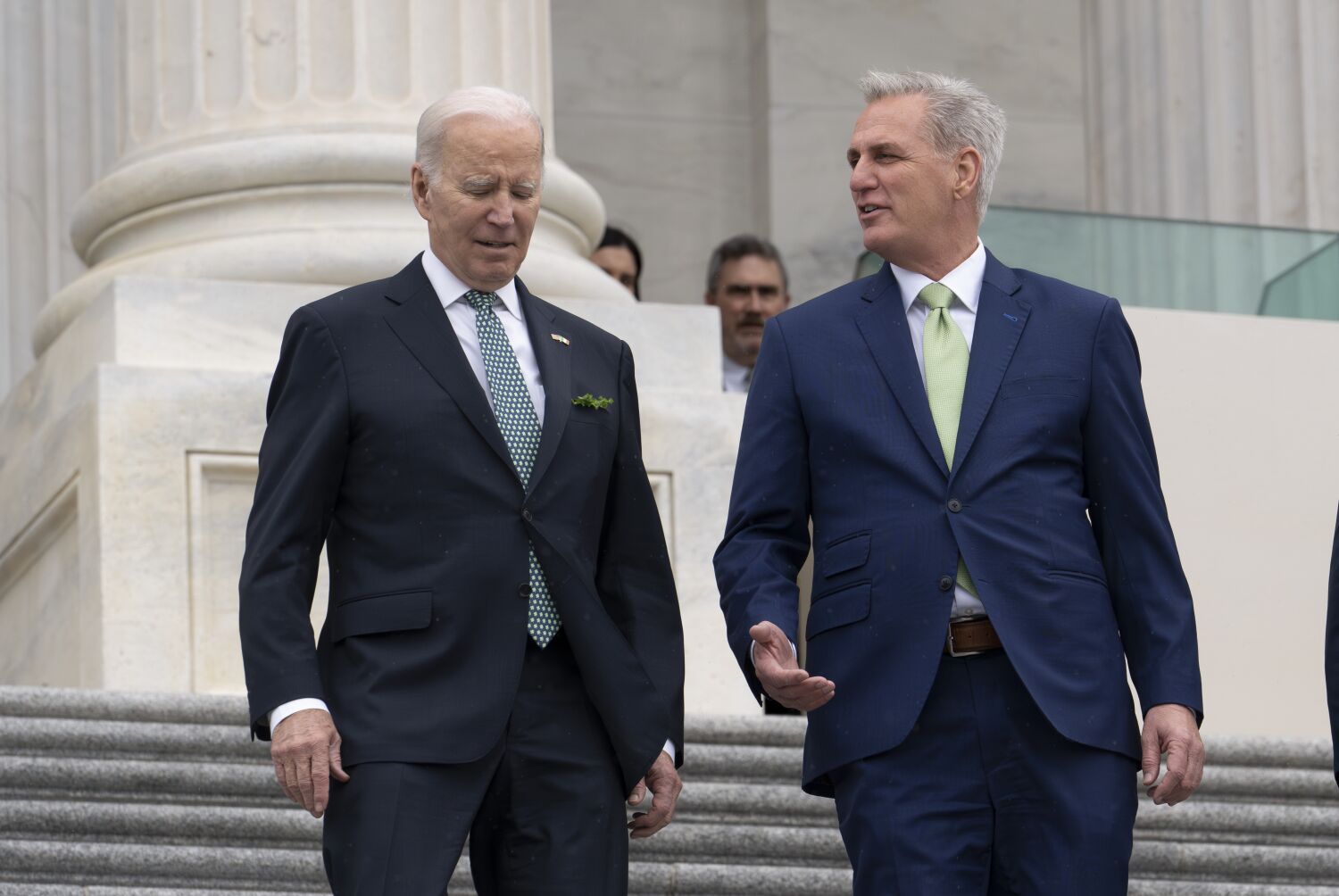[ad_1]

It’s time to begin worrying in regards to the debt ceiling.
The federal authorities is careening towards its borrowing credit score restrict, past which the Treasury received’t be capable to pay all its payments.
The results could possibly be actually catastrophic — a worldwide monetary crash — or merely damaging: a soar in rates of interest, a plummeting inventory market and a extra possible recession.
Final week, Treasury Secretary Janet L. Yellen mentioned the “X Date,” the day the cash runs out, may arrive as quickly as June 1.
The issue, in fact, is politics.
President Biden desires Congress to elevate the debt ceiling with out important circumstances, simply because it did 3 times when President Trump was within the White Home. However the brand new Republican majority within the Home desires to power Biden to simply accept deep spending cuts and scrap a few of his favourite packages.
“They’re attempting to carry the debt hostage,” Biden complained Friday.
Republicans have used the H-word too.
“It’s a hostage that’s value ransoming,” Senate Minority Chief Mitch McConnell (R-Ky.) mentioned after a earlier debt disaster.
Each side insist they’re decided to keep away from a catastrophic default. However taking part in rooster over the debt ceiling is a bit just like the nuclear stability of terror: Neither aspect desires a conflagration, however they may simply stumble into one.
Political polarization has made the issue more durable to unravel. Home Speaker Kevin McCarthy (R-Bakersfield) has his job because of the hard-line Freedom Caucus, which has lengthy opposed elevating the debt ceiling below any circumstance.
In idea, there are many methods to unravel this drawback — the debt ceiling has been raised seven occasions within the final decade — however most would require each side to make painful concessions.
“The debt ceiling combat is sort of a kidney stone. You’re going to move it; it’s only a query of how painful it’s going to be,” mentioned Amy Walter, editor of the Prepare dinner Political Report, quoting a veteran lobbyist.
Final month, Home Republicans agreed on a gap bid: They supplied to elevate the debt ceiling for one yr if Democrats agree to chop nondefense spending (besides Social Safety and Medicare) by an estimated 22%, an awfully deep discount.
Biden has supplied to barter over spending cuts, however says he received’t discount so long as the GOP holds the debt ceiling hostage. He has little selection, nevertheless, since Republicans management the Home and make up nearly half of the Senate.
Talks are scheduled to start Tuesday on the White Home. Neither aspect expects a fast settlement.
Biden desires to protect the bold home packages he enacted over the past two years, when Democrats held majorities in each the Home and Senate. Republicans need to scrap a lot of these packages, together with clear power, pupil mortgage reduction and Medicaid enlargement. The GOP additionally desires to chop funding for the Inner Income Service, which might have the perverse impact of accelerating the federal deficit.
There are a number of potential options.
Republicans may agree to boost the debt ceiling in trade for critical funds negotiations. However the Freedom Caucus has already rejected that final result — and if its members bolt, McCarthy may lose the speakership.
The 2 sides may cut up the distinction: Elevate the debt restrict as soon as funds negotiations are underway, starting with an settlement on total spending ranges. However it might nonetheless be tough to succeed in a deal that may move each the Democrat-led Senate and the Republican-led Home.
If talks with McCarthy bathroom down, Biden may attempt to strike a cope with McConnell. That’s what occurred in 2011, when then-Vice President Biden and the Senate Republican chief labored out a compromise.
However McConnell has mentioned McCarthy and the Home Republicans ought to take the lead.
Maybe most definitely, the 2 sides may determine they want extra time and elevate the debt ceiling whereas negotiations proceed.
With a presidential marketing campaign underway, these maneuvers are additionally about who will probably be blamed if one thing goes improper.
Each side declare the general public is on their aspect. They’re each half proper. Republicans level out that the majority voters don’t need to enhance the nationwide debt, and that’s true. However Democrats level out that the majority voters don’t just like the deep spending cuts the GOP has proposed — additionally true.
A Washington Post-ABC News poll final week discovered a strikingly symmetrical response, with 78% of Democrats saying they’d blame Republicans if the federal government defaulted on its debt, and 78% of Republicans saying they’d blame Biden. Independents have been divided, however barely extra inclined responsible the GOP.
One lacking issue: Wall Avenue and the enterprise group haven’t weighed in. “They appear to imagine that it’ll all get labored out,” a Democratic aide instructed me.
That was true for previous debt ceiling battles — three throughout the Trump administration and no fewer than six throughout the Obama administration.
However it is a extra polarized period, with extra members of Congress — particularly on the appropriate — who’ve gained energy by refusing to compromise.
Fixing the deadlock might depend upon McCarthy’s knowledge and braveness, two commodities that haven’t been reliably measured. He has little expertise as a bipartisan deal maker.
The probabilities of missteps and miscalculations are increased.
That makes the probabilities of a catastrophic default or a harmful near-default a lot better than earlier than.

